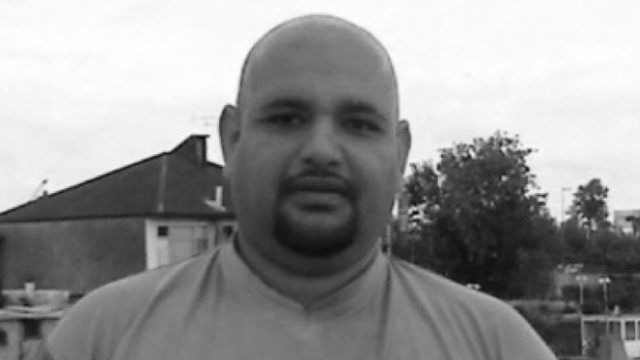
Image of “Symbolic Prison Cell” in Iran from Babak Farroki. Image taken from Flickr under CC By 2.0.
A version of this article was originally published on the site of the International Campaign for Human Rights in Iran.
Soheil Babadi has waited nearly a year for a ruling on his appeal against his prison sentence. Babadi was imprisoned in Iran in 2014 for posting jokes on a satirical Facebook page.
Authorities have meanwhile refused to release him on bail or allow him to receive medical treatment outside of Rajaee Shahr Prison in Karaj (west of Tehran) where he has been held in Ward 12—where political prisoners are kept—since October 1, 2014.
An informed source told the International Campaign for Human Rights in Iran that Babadi’s appeal was filed more than 10 months ago, and that the Appeals Court last looked into his case in April 2016, but “the case judge has neither issued a verdict nor agreed to release Babadi on bail.”
“Those in charge of this case have deliberately prolonged Babadi’s prosecution,” added the source. “Now he needs to go on medical furlough [temporary leave] to get treatment for his kidney problem, but the officials refuse to allow him until he gets a final verdict.”
Political prisoners in Iran are routinely singled out for harsh treatment, which often includes denial of medical care.

Banner image from Emam Naghi Facebook page.
The 39-year-old computer engineer was arrested on May 22, 2012 after allegedly posting jokes on the “Campaign to Remind Shiites about Imam Naghi” Facebook page (seen above), which satirizes political and religious issues while focusing on Ali al-Naghi—the tenth Imam according to Shia Islam. The page, which has nearly 33,000 fans, gained popularity after the song “Naghi” by musical artist Shahin Najafi went viral in early May 2012 and at least two senior theologians issued fatwas calling for Najafi’s death for insulting Naghi.
After his arrest, Babadi was held for more than 200 days in Ward 2-A of Tehran’s Evin Prison, which is controlled by the Islamic Revolutionary Guards Corps (IRGC). During that time he was tortured and denied basic rights, according to an open letter he wrote from prison on September 7, 2013.
“In May 2011 I posted ten short pieces of satire on a Facebook page called the ‘Campaign to Remind Shiites about Imam Naghi’ without using any insulting words,” said the letter. “A year later I was arrested by the IRGC’s Intelligence Organization without a warrant and held in Ward 2-A, the IRGC’s exclusive detention center, and beaten and interrogated for 24 hours.”
Babadi continued: “Then someone named Ghena’atkar (from Branch 3 of the Security Court) formally read the charges against me, including ‘insulting the Prophet Mohammad,’ ‘insulting the sacred,’ ‘assembly and collusion,’ ‘insulting the supreme leader,’ ‘propaganda against the state,’ ‘membership in a group planning to overthrow the state’ ‘and acting against national security’—all for writing ten jokes on Facebook.”
“I was interrogated while blindfolded in the corner of a room,” he added. “The agent wanted me to confess to the charges against me, and when I refused he severely beat me. I was constantly under psychological pressure as the agents probed into my personal life and tried to accuse me of sexual relations with friends and relatives, even with my sister-in-law, and even of homosexual relations with one of my friends, Mostafa. But they didn’t succeed and kept me in solitary confinement for 225 days.”
The practice of forced “confessions” in Iran, including those elicited under torture or the threat of torture, has been well documented by international human rights organizations.

Soheil Babadi, the imprisoned Facebook users convicted for posting jokes. Photo taken from ICHRI and used with permission.
Babadi indicated in his letter that his basic rights were denied primarily because his jokes were turned into a security case. During his interrogation his back was injured after severe beatings, he was held incommunicado for months in solitary confinement, and he was detained for a year before his first trial.
Babadi was first charged with “insulting the sacred” and “insulting President [Mahmoud Ahmadinejad],” and sentenced to five-and-a-half years in prison, 74 lashes and two years in exile in the city of Beshagard near the southern port of Bandar Abbas.
In a second trial in September 2015 Judge Mohammad Moghisseh of Branch 28 of the Revolutionary Court sentenced Babadi to an additional seven years in prison for “assembly and collusion against national security” and “insulting the supreme leader.” Branch 26 of the Appeals Court has yet to issue a verdict on the appeal against Babadi’s sentence.
All of the charges against Babadi relate to his Facebook posts. If Article 134 of Iran’s New Islamic Penal Code is applied to his case, his combined sentence could be reduced to seven-and-a-half years in prison and he could be released on probation after four years.




1 comment